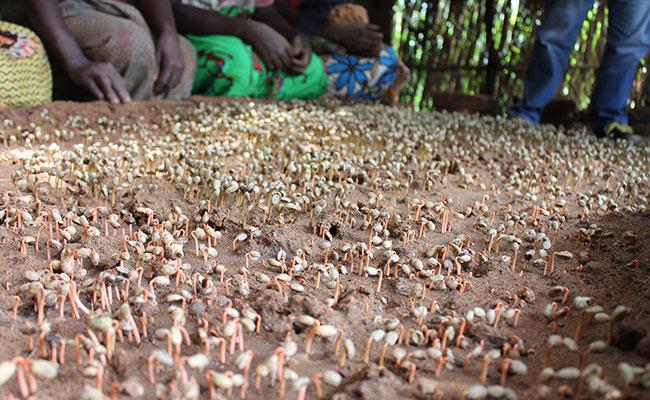The Business of Food Security
Leveraging commercial sustainability to help bolster health; nutrition; and water, sanitation, and hygiene interventions

Innovations in Development: Solutions for a better future
Patrick Norrell, director of agriculture and economic growth for Tetra Tech International Development Services, discusses the importance of incorporating commercial sustainability into food security programs, which in turn will help make economic growth more inclusive and resilient. All opinions expressed in this post are the author’s own.
Under Feed the Future, we agricultural development professionals have come to understand that helping farmers grow and sell more is simply not enough to sustainably improve lives and livelihoods. We also must identify and tackle a range of issues not strictly related to the movement of commodities from primary production to end consumer via the value chain. Increasingly, integrated development programming has prepared us to think beyond the framework of the value chain to consider the larger market system at work, with all of its interrelated social, political, and economic challenges and opportunities.
One of the most important questions we have been grappling with is how best to integrate separate technical disciplines, especially as we stand at the close of the first phase of Feed the Future and the roll-out of the next phase, through the Global Food Security Strategy. Donors and implementers still have a great deal of work to do to better recognize systemic relationships; share knowledge and best practices across disciplines; and design effective, integrated approaches for household food security, nutrition, and incomes.
Taking a market systems approach is one of the most promising routes to linking complex interventions and generating sustainable impact. Using this approach, we must continue the effort to make economic growth more inclusive and resilient and also to make health; nutrition; and water, sanitation, and hygiene (WASH) interventions more sustainable.
In Eastern Democratic Republic of Congo (DRC), the U.S. Agency for International Development (USAID) is rolling out an innovative program leveraging separate USAID Food for Peace, Feed the Future, Global Health, Governance, and Development Credit Authority investments in South Kivu. The portfolio activities address related systemic constraints, such as quality health service delivery, production of and demand for nutritious crops, credit guarantees, household dietary diversity, conflict mitigation, and governance. To help maintain a clear focus on shared goals and formalize coordination between implementing partners, these initiatives function under a common results framework and theory of change and with several shared impact indicators across activities.
From this portfolio, Tetra Tech is implementing the five-year Feed the Future Democratic Republic of the Congo Strengthening Value Chains Activity (SVC). The SVC Activity serves as the marketing component of USAID’s combined investment and contributes to increased incomes and enhanced financial sustainability for all of USAID’s beneficiaries in eastern DRC. SVC is designed to promote private sector principles of profitability, competitiveness, and entrepreneurship. It emphasizes establishing local and regional market linkages for nutritious crops (dried beans and soy) and export linkages for cash crops (coffee). In short, SVC is in the business of food security.
SVC increases market demand for nutritious products; leverages public-private partnerships; promotes private sector investment; and facilitates access to credit to support improved storage, transformation, and processing of nutritious foods. SVC also links local farmers’ associations—especially women farmers and women-owned agribusinesses—to local bean and soy markets and specialty coffee export markets, ensuring farmers have the capacity to produce and purchase nutritious foods for their families. Tetra Tech’s approach is driven by cost-benefit analysis, which makes a clear business case to beneficiaries for their investments in relation to the returns associated with interventions promoted by the Activity.
Most importantly, SVC will generate off-farm employment through assisted post-harvest enterprises such as traders, processors, and logistics (storage and transport) firms; input suppliers and other agricultural service providers; information, training, and consulting firms; farmer organizations and industry associations. Jobs at these non-farm agribusinesses offer the opportunity to diversify rural livelihoods beyond agricultural production, provide more appealing career paths for youth and women, and benefit the local economy doubly—first through the growth of the farms that access their markets, goods, or services and second through their own contributions to local jobs, wages, and taxes. Over time, diversified rural economies, including competitive farm and off-farm agribusiness sectors, will be better able to support inclusive and resilient economic growth, improved nutrition and health status, and strengthened and responsive governance.
Despite the fragile environment of eastern DRC, USAID has recognized both the vibrant domestic and cross-border economy at work, as well as the importance of private investment for the growth and sustainability of local food systems. By layering and sequencing investments in the same geographic region, USAID and its implementing partners can comprehensively address the underlying causes of conflict and instability that have for so long crippled the region. This includes sustained adoption of climate-smart agricultural practices, community-based resilience strategies, improved nutrition and health behaviors, and inclusive value chain development for women, youth, and vulnerable populations.
At Tetra Tech, we are excited by the potential of USAID’s integrated design to transition farmers and young entrepreneurs from relief to development in eastern DRC. We believe our market systems approach will integrate private sector capital and entrepreneurial action across USAID’s combined program, amplifying basic investments in agricultural production, nutrition, health, and governance into a diversified and strengthened rural economy and sustainably moving beneficiaries along the continuum from hunger to food security.

